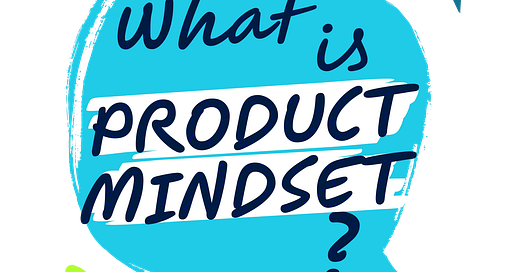What Is Product Mindset?
Envisioning, delivering, and validating value is at the core of the product mindset. Only in an empirical, iterative way can you build products that resonate with users' needs and expectations.
The product mindset extends beyond mere product development; it's an overarching philosophy that guides decision-making, strategy, and execution with a relentless focus on the end user.
It ensures that every effort is directed towards enhancing user satisfaction and achieving long-term success while creating a culture of continuous improvement, innovation, and user-centricity.
1. User-Centric Design and Development:
The unwavering commitment to understanding customers’ problems and meeting users' needs is at the heart of a product mindset. This involves engaging with users, empathising with their challenges, and designing solutions that solve their problems and deliver a delightful experience. By prioritising user feedback and data-driven insights, the product evolves in a direction that truly serves its intended audience.
2. Iterative and Incremental Value Delivery:
Embracing a product mindset means recognising the importance of delivering value in small, manageable increments. This approach allows for frequent reassessments and adaptations based on user feedback, ensuring that the product remains relevant and valuable to its users and fostering a sense of trust and loyalty.
3. Cross-functional Collaboration and Ownership:
A product mindset cultivates an environment where cross-functional teams come together, contributing with their perspectives and expertise. This collaborative culture encourages a sense of shared ownership and accountability for the product's success, helping to break down silos and promoting open communication, innovative solutions, and a more cohesive product strategy.
4. Adaptability and Resilience:
Adaptability is critical in a constantly changing market. A product mindset embraces change as an opportunity for growth and improvement. It involves being receptive to new information, trends, and feedback and having the flexibility to pivot strategies when necessary. This resilience ensures that the product survives and thrives in the face of challenges and competition.
5. Sustainable Growth and Scalability:
A long-term vision is crucial for sustainable growth. A product mindset focuses on building scalable solutions that adapt and grow with the user base and market demands. This foresight prevents short-sighted decisions that could compromise the product's future viability, ensuring a roadmap that balances immediate wins with long-term ambitions.
6. Quality is a fundamental principle of a product mindset:
This commitment to excellence is present in every aspect of the product, from the user interface and performance to customer support and beyond. It's about creating a product that meets and exceeds user expectations, setting a high standard in the marketplace.
Adopting a product mindset is about embracing a philosophy that puts the user at the centre of every decision, fosters collaboration and continuous improvement, and aims for long-term success through adaptability and quality.
It's about creating value and achieving sustainable growth by building the right product. This mindset is crucial in today's dynamic market, where understanding and meeting user needs are critical differentiators in a crowded space.





